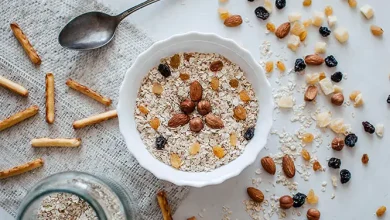Can Eating Oat Porridge (Oatmeal) Cause Constipation?

CCan Oat Porridge (Oatmeal) Lead to Constipation? Understanding the Digestive Effects of a Popular Breakfast
As more people focus on maintaining a healthy, balanced diet, oat porridge, or oatmeal, has become a popular choice. It’s easy to prepare, packed with essential vitamins and minerals, and known for its high fiber content, which aids digestion. But can this very fiber, often praised for promoting regularity, also cause constipation?
In this article, we’ll explore whether eating oatmeal can lead to digestive issues and how you can enjoy its benefits without any negative effects on your digestion.
Nutritional Benefits of Oats
Oats are packed with nutrients, offering fiber, protein, and essential vitamins and minerals like magnesium, manganese, phosphorus, zinc, and B vitamins. They provide both soluble and insoluble fiber: soluble fiber helps you feel full longer, while insoluble fiber supports healthy bowel movements.
Oats are also rich in beta-glucan, a type of fiber known to lower cholesterol. A 50g serving of dry oats contains:
- 194 calories
- 8.4g of protein
- 33.14g of carbohydrates
- 3.45g of fat
- 5.3g of dietary fiber
The Benefits of Eating Oat Porridge
Adding oatmeal to your diet has several advantages:
- Lowers cholesterol: Beta-glucan helps reduce cholesterol absorption in the gut.
- Keeps you full: Soluble fiber slows digestion, helping you feel satisfied for longer.
- Rich in nutrients: Oats provide essential vitamins and minerals that support overall health.
- Supports digestion: The high fiber content promotes regular bowel movements and reduces the risk of constipation.
Can Oatmeal Cause Constipation?
While oats are generally known for promoting regularity, consuming too much oatmeal at once can sometimes cause constipation. An excessive intake of fiber may overwhelm the digestive system, making it difficult for the body to process, potentially leading to hard stools and constipation.
If your body isn’t used to high-fiber foods, a sudden increase in oatmeal consumption can disrupt digestion. Additionally, anti-nutrients found in oats may interfere with nutrient absorption in some people, causing digestive discomfort or inflammation.
It’s important to note that not everyone will have the same reaction to oatmeal—some people may experience constipation, while others find it helpful for staying regular.
How to Prevent Constipation While Eating Oatmeal
To avoid constipation from oatmeal, consider these tips:
- Start small: If you’re new to high-fiber foods, gradually introduce oats into your diet.
- Spread out your fiber intake: Instead of eating a large serving of oatmeal all at once, try having smaller portions throughout the day.
- Stay hydrated: Drinking enough water is key to aiding digestion and preventing constipation.
- Add digestion-friendly ingredients: Pair your oatmeal with probiotics, bananas, or yogurt to improve digestion.
- Limit added sugar: Avoid adding excess sugar to your oatmeal, as it can worsen digestive issues.
By following these suggestions, you can enjoy the nutritional benefits of oats without experiencing constipation. If digestive problems persist, it might be helpful to reduce your oat intake and consult a healthcare professional.
Other Foods and Factors That Can Cause Constipation
Oats aren’t the only potential cause of constipation. Other foods and lifestyle factors can also contribute, such as:
- Red meat, cheese, and processed foods: These can slow down digestion and lead to constipation.
- Dairy: Some people may experience constipation from dairy products like milk, in which case lactose-free options might help.
- Nutrient deficiencies: Lacking magnesium, vitamin D, B12, or folic acid can contribute to constipation. Ensuring your diet includes plenty of fiber-rich fruits and vegetables, along with staying hydrated, is essential for healthy digestion.
Can Oat Porridge Cause Constipation in Babies?
Oat porridge usually helps prevent constipation in babies, but too much can have the opposite effect. It’s important to offer a variety of fiber-rich foods, like potatoes or sweet potatoes, to avoid constipation. Make sure your baby gets enough fluids, primarily breast milk or formula, and consult a doctor before introducing water to babies under six months.
Can Overnight Oats Cause Constipation?
While overnight oats can be a convenient way to boost your daily fiber intake, eating too much can cause constipation. The high fiber and slow-release carbs in overnight oats may slow down digestion. Be sure to balance your diet with other fiber-rich foods and drink plenty of water if you regularly consume overnight oats.
Final Thoughts on Oat Porridge and Constipation
Oats are a nutritious and beneficial food when consumed in moderation. However, eating too much oatmeal can lead to constipation for some individuals. By balancing oatmeal with other fiber-rich foods, staying hydrated, and ensuring your diet provides essential nutrients, you can enjoy the benefits of oats without digestive discomfort. If constipation continues to be an issue, it’s always best to seek advice from a healthcare professional.




